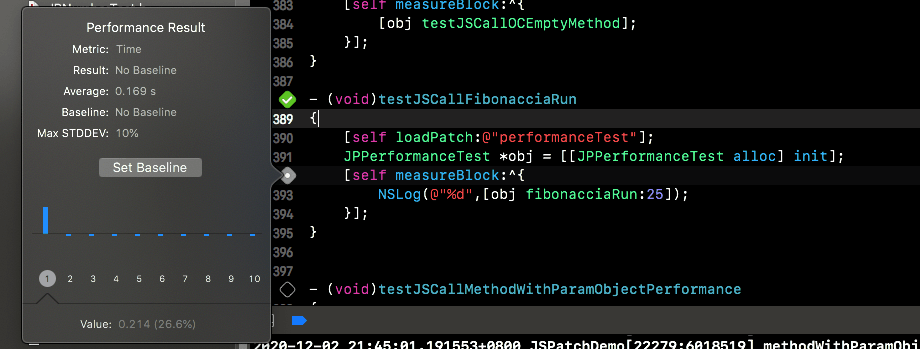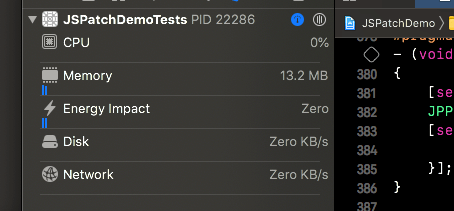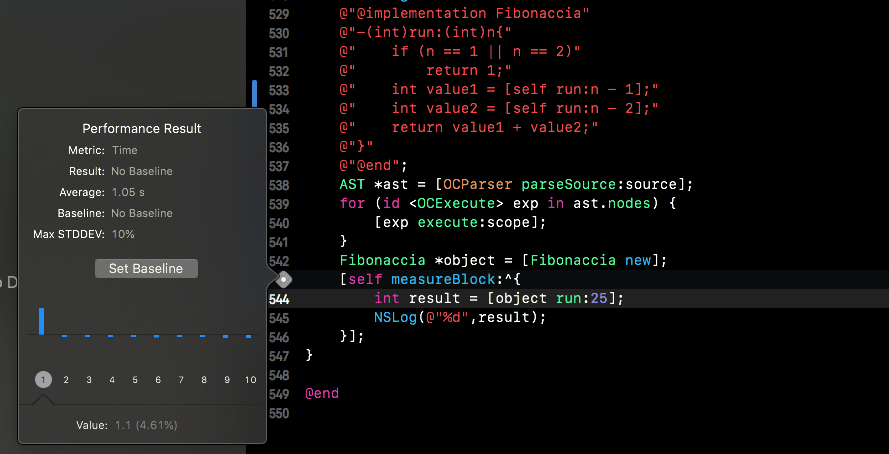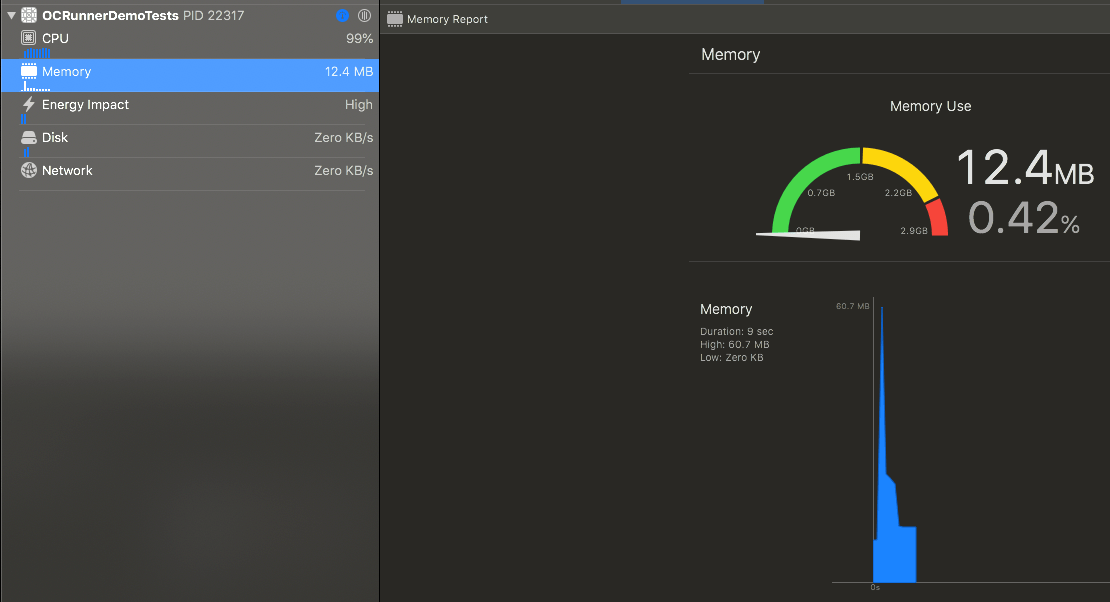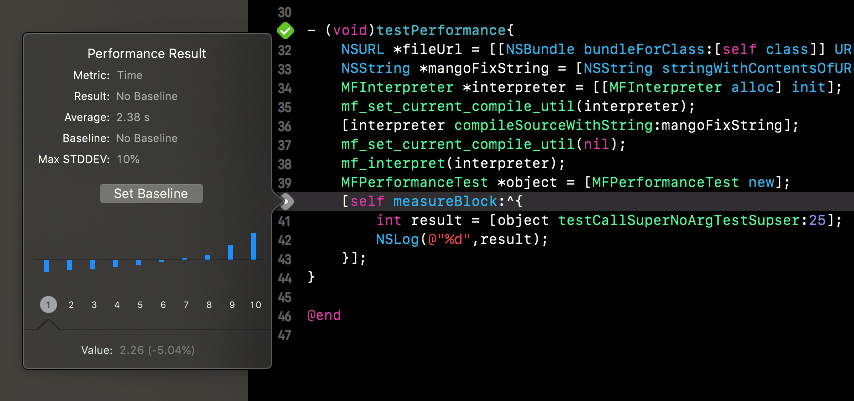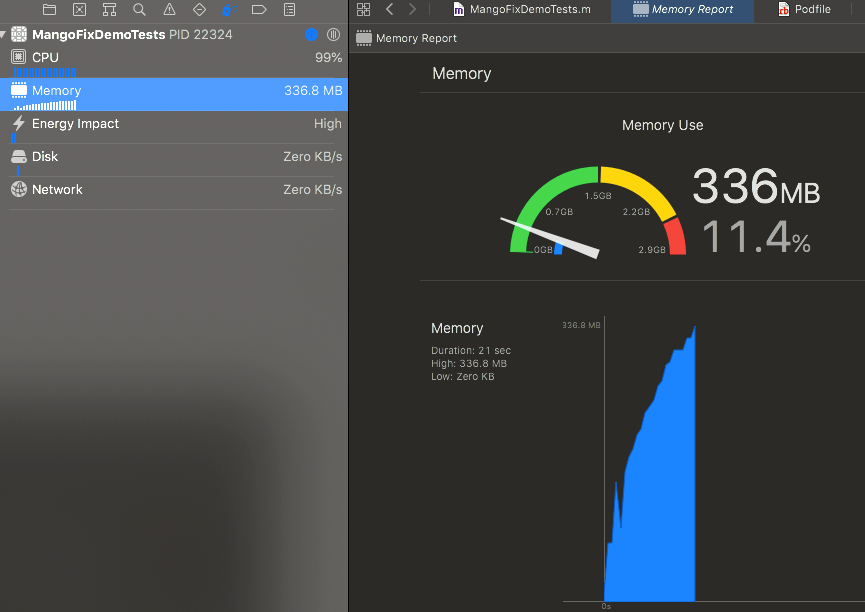OCRunner QQ群: 860147790
The work flow of using OCRunner to generate a patch
- oc2mangoLib is equivalent to a simple compiler, responsible for generating the abstract syntax tree.
- ORPatchFile is responsible for serializing and deserializing the abstract syntax tree and determining whether the version is available.
- PatchGenerator is responsible for integrating the functions of oc2mangoLib and ORPatchFile. (All the above tools are in the oc2mango project).
- OCRunner is responsible for executing the abstract syntax tree.
-
Use binary patch files. Increase security, reduce patch size, optimize startup time, and can be optimized in the PatchGenerator stage.
-
Custom Arm64 ABI (You can also choose to use libffi)
-
Complete Objective-C syntax support, but does not support pre-compilation and partial syntax.
OCRunnerDemo can be used as a reference for the entire process.
pod 'OCRunner' #Support all architectures, including libffi.a
# or
pod 'OCRunnerArm64' #Only supports arm64 and arm64e, does not include libffi.aDownload PatchGenerator
Unzip PatchGenerato.zip, then save PatchGenerator to /usr/local/bin/ or the project directory.
-
Project Setting -> Build Phases -> click
+in the upper left corner ->New Run Script Phase -
[Path to PatchGenerator file] -files [Objective-C source files or diretory] -refs [Objective-C header files or diretory] -output [Path to save the patch]
-
for example:
Run Scriptin OCRunnerDemo$SRCROOT/OCRunnerDemo/PatchGenerator -files $SRCROOT/OCRunnerDemo/ViewController1 -refs $SRCROOT/OCRunnerDemo/Scripts.bundle -output $SRCROOT/OCRunnerDemo/binarypatch
-
Add the generated patch file as a resource file to the project.
-
Appdelegate.m
- (BOOL)application:(UIApplication *)application didFinishLaunchingWithOptions:(NSDictionary *)launchOptions {
#if DEBUG
NSString *patchFilePath = [[NSBundle mainBundle] pathForResource:@"PatchFileName" ofType:nil];
#else
// download from server
#endif
[ORInterpreter excuteBinaryPatchFile:patchFilePath];
return YES;
}- Every time you modify the file, remember to use Command+B, call
Run Scripto regenerate the patch file.
- Upload the patch to the resource server.
- Download and save the patch file in the App.
- Use [ORInterpreter excuteBinaryPatchFile:PatchFilePath] to execute the patch.
You can run the following code by modifying ViewController1 in OCRunnerDemo.
// A new type called dispatch_once_t will be added
typedef NSInteger dispatch_once_t;
// link NSLog
void NSLog(NSString *format, ...);
typedef enum: NSUInteger{
UIControlEventTouchDown = 1 << 0,
UIControlEventTouchDownRepeat = 1 << 1,
UIControlEventTouchDragInside = 1 << 2,
UIControlEventTouchDragOutside = 1 << 3,
UIControlEventTouchDragEnter = 1 << 4
}UIControlEvents;
int main(){
UIControlEvents events = UIControlEventTouchDown | UIControlEventTouchDownRepeat;
if (events & UIControlEventTouchDown){
NSLog(@"UIControlEventTouchDown");
}
NSLog(@"enum test: %lu",events);
return events;
}
main();Tips:
It is recommended to create a new file to place the above code, similar to the UIKitRefrence and GCDRefrence files in OCRunnerDemo, and then add the patch generation in the form of -links.
//you only need to add the C function declaration in Script.
//link NSLog
void NSLog(NSString *format, ...);
//then you can use it in Scrtips.
NSLog(@"test for link function %@", @"xixi");You can run the code by changing the content of ViewController1 in OCRunnerDemo.
When you add this code in scripts. OCRunner will use ORSearchedFunction to search the pointer of function name. It's core is SymbolSearch (edit from fishhook).
If the searched result of function name is NULL,OCRunner will notice you in console like this:
|----------------------------------------------|
|❕you need add ⬇️ code in the application file |
|----------------------------------------------|
[ORSystemFunctionTable reg:@"dispatch_source_set_timer" pointer:&dispatch_source_set_timer];If you want to fix a method, you can reimplement the method without implementing other methods.
@interface ORTestClassProperty:NSObject
@property (nonatomic,copy)NSString *strTypeProperty;
@property (nonatomic,weak)id weakObjectProperty;
@end
@implementation ORTestClassProperty
- (void)otherMethod{
self.strTypeProperty = @"Mango";
}
- (NSString *)testObjectPropertyTest{
[self ORGtestObjectPropertyTest] // Add'ORG' before the method name to call the original method
[self otherMethod];
return self.strTypeProperty;
}
@end__weak id object = [NSObject new];
// Minimal block
void (^a)(void) = ^{
int b = 0;
};
a();Its essence is Use system built-in C functions. It is added through the GCDRefrences file in OCRunnerDemo. The GCD related function declaration and typedef are all included in it.
For Example:
// link dispatch_sync
void dispatch_sync(dispatch_queue_t queue, dispatch_block_t block);
void main(){
dispatch_queue_t queue = dispatch_queue_create("com.plliang19.mango",DISPATCH_QUEUE_SERIAL);
dispatch_async(queue, ^{
completion(@"success");
});
}
main();// Inline function: just add a global function in the patch, such as `CGRectMake` in UIKitRefrences
CGRect CGRectMake(CGFloat x, CGFloat y, CGFloat width, CGFloat height)
{
CGRect rect;
rect.origin.x = x; rect.origin.y = y;
rect.size.width = width; rect.size.height = height;
return rect;
}
// Pre-compiled function: you need to add the following code in the App
[[MFScopeChain top] setValue:[MFValue valueWithBlock:^void(dispatch_once_t *onceTokenPtr,
dispatch_block_t _Nullable handler){
dispatch_once(onceTokenPtr,handler);
}] withIndentifier:@"dispatch_once"];Device: iPhone SE2 , iOS 14.2, Xcode 12.1.
Take the classic Fibonacci sequence function as an example, find the test result of the value of the 25th term
-
Execution time, the average time is 2.38s
-
The memory usage continues to rise, reaching about 350MB at the highest point.
- When testing with recursive functions, the performance of OCRunner is 1/5 times JSPatch's, and is 2.5 times Mango's.
- OCRunner's patch loading speed is about 20 times + that of Mango, and this value increases as the patch size increases. and the result of JSPatch is unknown.
- Regarding the memory usage of recursive method calls, there is currently a problem of excessive usage. When finding the 30th item of the Fibonacci sequence, Mango will burst the memory, and the peak memory usage of OCRunner is about 600MB.
- Pointer and multiplication sign identification conflicts, derived problems: type conversion, etc.
- Not support static、inline function declaration
- Not support C array declaration: type a[]、type a[2]、value = { 0 , 0 , 0 , 0 }
- Not support '->' operation symbol...
- Not support fix C function
- Class declaration and implementation, support Category
- Protocol
- Block
- struct、enum、typedef
- Use function declarations to link system function pointers
- Global function
- Multi-parameter call (methods and functions)
- *、& (Pointer operation)
- Variable static keyword
- NSArray: @[value1, value2],NSDictionary: @{ key: value }, NSNumer: @(value)
- NSArray, NSDictionary value and assignment syntax: id value = a[var]; a[var] = value;
- Operator, except for'->' all have been implemented
etc.
- Mango
- libffi
- Procedure Call Standard for the ARM 64-bit Architecture.
- @jokerwking



